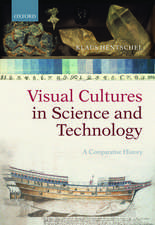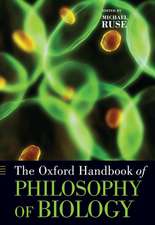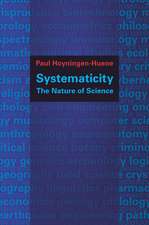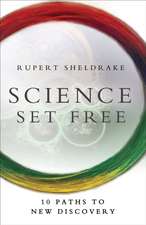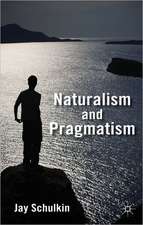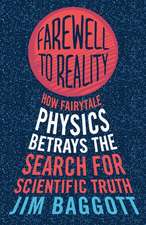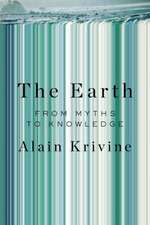Ignorance: How It Drives Science
Autor Stuart Firesteinen Limba Engleză Hardback – 19 iul 2012
Preț: 123.36 lei
Preț vechi: 149.85 lei
-18% Nou
Puncte Express: 185
Preț estimativ în valută:
23.61€ • 25.66$ • 19.85£
23.61€ • 25.66$ • 19.85£
Carte disponibilă
Livrare economică 20-26 martie
Livrare express 14-20 martie pentru 48.61 lei
Preluare comenzi: 021 569.72.76
Specificații
ISBN-13: 9780199828074
ISBN-10: 0199828075
Pagini: 208
Dimensiuni: 132 x 180 x 23 mm
Greutate: 0.3 kg
Editura: Oxford University Press
Colecția OUP USA
Locul publicării:New York, United States
ISBN-10: 0199828075
Pagini: 208
Dimensiuni: 132 x 180 x 23 mm
Greutate: 0.3 kg
Editura: Oxford University Press
Colecția OUP USA
Locul publicării:New York, United States
Recenzii
This is a lovely little book, which is truly about what drives science; and its not about physics, or chemistry, or engineering, but real biology.
This is a lovely little book ... Give it to your friends or relatives to explain why you do science.
[B]oth concise and splendidly aphoristic.
A valuable acquisition for academic libraries, given the current emphasis on STEM education and undergraduate research.
It is important to emphasize the creative process in the sciences. This is not just another methodological book on the empirical cycle, but an unpretentious and smooth-reading plea for attention on an uncultivated but mineable area.
An excellent read, [it is] a fine companion text for potential scientists a the beginning of their studies ... You may gradually become more and more ignorant as you read, and you will enjoy the journey. Ignorance in this telling is truly bliss.
a quietly mind-blowing new book.
Stuart Firestein, a teacher and neuroscientist, has written a splendid and admirably short book about the pleasure of finding things out using the scientific method. He smartly outlines how science works in reality rather than in stereotype. Ignorance is a thoughtful introduction to the nature of knowing, and the joy of curiosity.
A splendid book ... Packed with real examples and deep practical knowledge, Ignorance is a thoughtful introduction to the nature of knowing, and the joy of curiosity.
The fundamental attribute of successful scientists, Firestein argues in this pithy book, is a form of ignorance characterised by knowing what you don't know, and being able to ask the right questions.
The book is effectively conversational and can be read quickly, as intended.
In Ignorance: How It Drives Science Stuart Firestein goes so far as to claim that ignorance is the main force driving scientific pursuit. Firestein, a popular professor of neurobiology at Columbia, admits at the outset that he uses "the word ignorance at least in part to be intentionally provocative" and clarifies that for him it denotes a "communal gap in knowledge." He describes clearly how scientists continually uncover new facts that confront them with the extent of their ignorance, and how they successfully grapple with uncertainty in their daily research work... Especially valuable is Firestein's ability to capture how science gets done in fits and starts... He demystifies the day-to-day activities of research scientists across a variety of disciplines with case studies illustrating how breakthroughs in understanding, however humble or grand, are essentially unforeseeable even to a seasoned mind.
This is a lovely little book ... Give it to your friends or relatives to explain why you do science.
[B]oth concise and splendidly aphoristic.
A valuable acquisition for academic libraries, given the current emphasis on STEM education and undergraduate research.
It is important to emphasize the creative process in the sciences. This is not just another methodological book on the empirical cycle, but an unpretentious and smooth-reading plea for attention on an uncultivated but mineable area.
An excellent read, [it is] a fine companion text for potential scientists a the beginning of their studies ... You may gradually become more and more ignorant as you read, and you will enjoy the journey. Ignorance in this telling is truly bliss.
a quietly mind-blowing new book.
Stuart Firestein, a teacher and neuroscientist, has written a splendid and admirably short book about the pleasure of finding things out using the scientific method. He smartly outlines how science works in reality rather than in stereotype. Ignorance is a thoughtful introduction to the nature of knowing, and the joy of curiosity.
A splendid book ... Packed with real examples and deep practical knowledge, Ignorance is a thoughtful introduction to the nature of knowing, and the joy of curiosity.
The fundamental attribute of successful scientists, Firestein argues in this pithy book, is a form of ignorance characterised by knowing what you don't know, and being able to ask the right questions.
The book is effectively conversational and can be read quickly, as intended.
In Ignorance: How It Drives Science Stuart Firestein goes so far as to claim that ignorance is the main force driving scientific pursuit. Firestein, a popular professor of neurobiology at Columbia, admits at the outset that he uses "the word ignorance at least in part to be intentionally provocative" and clarifies that for him it denotes a "communal gap in knowledge." He describes clearly how scientists continually uncover new facts that confront them with the extent of their ignorance, and how they successfully grapple with uncertainty in their daily research work... Especially valuable is Firestein's ability to capture how science gets done in fits and starts... He demystifies the day-to-day activities of research scientists across a variety of disciplines with case studies illustrating how breakthroughs in understanding, however humble or grand, are essentially unforeseeable even to a seasoned mind.
Notă biografică
Stuart Firestein is Professor and Chair of the Department of Biological Sciences at Columbia University, where his highly popular course on ignorance invites working scientists to come talk to students each week about what they don't know. Dedicated to promoting science to a public audience, he serves as an advisor for the Alfred P. Sloan Foundation's program for the Public Understanding of Science and was awarded the 2011 Lenfest Distinguished Columbia Faculty Award for excellence in scholarship and teaching.



